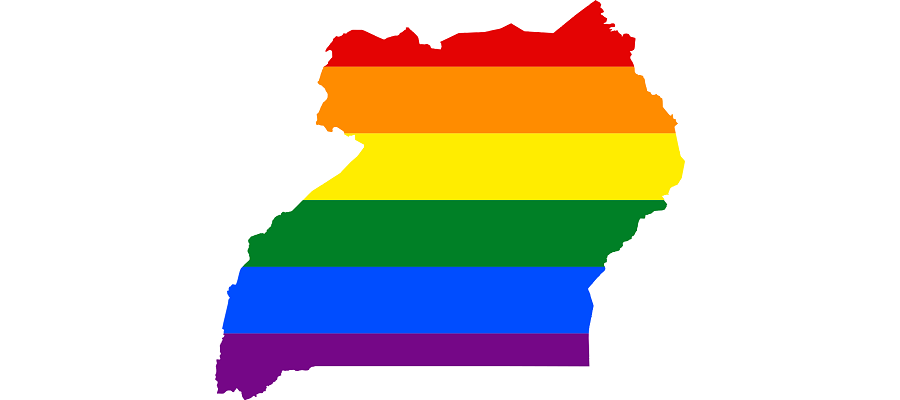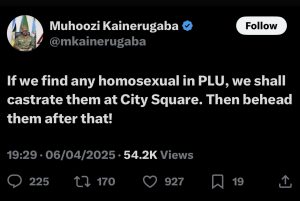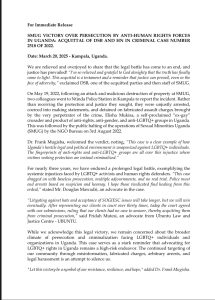It had been a tough few months for Uganda’s LGBTI community; the Anti Homosexuality Bill (commonly known as the Kill the Gays Bill) that was tabled by Member of Parliament for Ndorwa West David Bahati had been passed on 24th December 2013 and signed into law on 24th February the following year. What followed was a dramatic increase in the violence towards LGBTI persons as many lost their jobs, others were left homeless while many battled depression and anxiety over the uncertainty of their futures.
These effects of passing the AHB into law further led to an influx of the number of people, especially youth, that fled the violence in Uganda for the refugee camps of Kenya- many of whom are still there awaiting relocation. (Download a copy of Bombastic 5 to read their first hand recounts of their lives as refugees)
However, the afternoon of 1st August 2014 not only gave the community reason for celebration but renewed their hope that perhaps the justice system would one day listen to us and uphold our rights and humanity.
It should however be remembered that while we continue to hope for a fair and just system, this ACT was nullified on technical grounds as court did not render the law unfair but simply questioned the quorum of Parliament that passed the bill.
Overview of the case
Professor J Oloka-Onyango, the Honorable Fox Odoi-Oywelowo, Andrew M. Mwenda, Professor Moris Ogenga-Latigo, Dr. Paul Nsubuga Semugoma, Jacqueline Kasha Nabagesera, Julian Pepe Onziema, Frank Mugisha, Human Rights Awareness & Promotion Forum, and the Centre for Health, Human Rights & Development brought this case before the Constitutional Court of Uganda against the Attorney General on the grounds that Uganda’s Anti-Homosexuality Act 2014 (Act) violated several articles of the Ugandan Constitution.
Eleven issues were raised before the Court, including violation of freedom of expression, the right to privacy, principles of legality, the right to equality, freedom from discrimination, the right to dignity, and of rights guaranteed under various international human rights instruments (the African Charter on Human and People’s Rights and the International Covenant on Civil and Political rights, inter alia). However, the case was decided on one issue: whether or not quorum was met at the time the Act was passed. The Constitutional Court held that, because quorum was not met, the Anti-Homosexuality Act 2014 was passed in violation of the Constitution and must be invalidated.
Freedom of expression was explicitly discussed in section (i), which alleges that “Sections 7 and 13(1) & (2) of the Anti- Homosexuality Act 2014, in criminalising aiding, abetting, counseling, procuring and promotion of homosexuality, create offences that are overly broad, penalise, legitimate debate, professional counsel, HIV related service provision and access to health services, in contravention of the principle of legality, the freedoms of expression, thought, assembly and association, and the right to civic participation guaranteed under Principle XIV of the National objectives and Directive Principles of State Policy, Articles 2(1)&(2), 8A, 28(1), (3b), & 12, 29(1), 36, 38(2), 42 and 44(c) of the Constitution of the Republic of Uganda.”
Six years after the nullification, not much has changed for the Ugandan LGBTI community. The parliament of Uganda has continuously called for the retabling of the same bill with some legislators asserting that it should be given priority. The Parliamentarians have spewed hate for years; one of the most notable incidences is the Speaker of Parliament Rebecca Alitwala Kadaga spearheading a move to ban debates on any LGBTI related issues in the Inter Parliamentary Union.
Human rights violations against gender and sexual minorities within the country have also continued to rise with little police or legal interventions save for the few organisations that have dedicated their time, effort and resources to vehemently defend the rights of this marginalized group.
The Police and other law defenders, continue to be some of the biggest abusers of the rights of LGBTI persons inspite of the numerous advocacy and sensitization engagements that the community has had with them. Most recently, the Police arrested 22 youth from an LGBTI shelter and detained them in jail for over two months without arraignment in court or access to their legal representation. The Police has also over the years raided several LGBT events, calling them illegal gatherings and attempts to recruit people into homosexuality.
Asked how far the LGBTI movement and organizing has come since this law was struck down, Dr. Frank Mugisha, the Executive Director of Sexual Minorities Uganda said, “Since the nullification of the anti-gay law, there has been so much progress in the LGBT community. First and foremost, seeing that the law was nullified on a technicality and parliament that has been so eager to bring up a new law has not been successful in doing so today - that is progress in itself. There is also more visibility with in the LGBT community; we have more partners and allies within the country and most importantly, we have made so much progress within the health sector.”
On why this nullification was of great significance to Uganda’s LGBTI community, the Executive Director of Chapter Four said, “First of all, the nullification of the AHA was a hugely significant decision. I felt so many LGBTI individuals and organizations that were at that time facing this battle of criminalization of their activities and their love lives. It was definitely significant as it halted the ongoing investigations and prosections against LGBTI individuals and allies. It was also significant because it pushed back further away the white American evangelical groups who had stationed in the country and made the country the pain for their most homophobic campaign. With that said, the biggest problem for the LGBTI community in Uganda is really not the law. The law is a very small part of the larger problem of the community because the law is selectively applied and often times ignored. Further, what is debilitating is the homophobic public or community in Uganda. And many times, these actions go unreported, they are subtle and they are only experienced in the cases of LGBTI individuals. From the grocery store next door to bodaboda riders and taxi drivers to sentimental government officials. All these combined create a very toxic, painful lived experience for the LGBTI+ community. So the larger part of the problem really is the attitude of the community. “
As we mark six years since the landmark ruling that struck down the AHA, we question how prepared we are as a movement should the bill be introduced?
“The LGBT community has always come together in hard times. If the law was to be re-tabled, we would strongly fight it. However, I feel so much reluctance from our partners - this might be a problem, forming and bringing together local support like we did in 2009, might be difficult,” Dr. Mugisha shared his fears for the community.
Kasha Jacqueline Nabagesera the Executive Director of Kuchu Times also echoed Dr Mugisha’s sentiments and worries. "This day was memorable but nothing much has changed 6yrs down the road. The nullification didn't change the mindsets of the masses. We have seen an increase in attacks, influx of refugees and many murders and arbitrary arrests so more work still needs to be done. Also, the political environment keeps us on our toes because of using us as scapegoats with threats of bringing back the bill. We still need your support technical, emotional more so financial," she said.
Mr. Opiyo however thinks that the community is better prepared this time around. “The lessons of activism that led to the nullification of the AHA have helped make the LGBTI community more organized and more prepared for any other onslaught unlike in 2009. The community has learned the ropes of advocacy; they have learned the strategies of engagement with public officials. They have learned legal strategies and documentation so that if any other law is tabled in Parliament, they are in a better place to confront it. There have built allies around the world who are powerful and able to stand with the community. If this law is retabled, the community is in a better place to challenge it than it was in 2009,” he asserted




